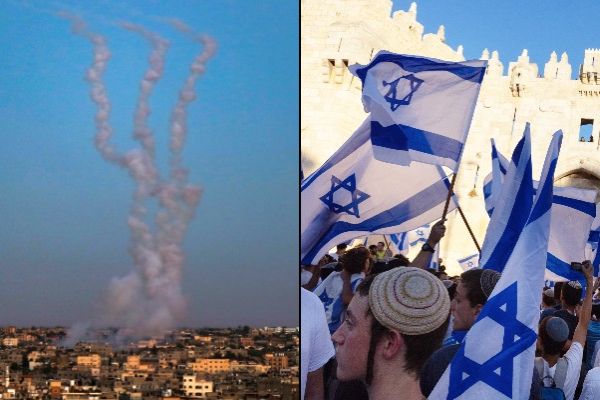Why didn’t Gaza terror groups follow through on their high-profile threats?
By Pesach Benson, United with Israel
Israel held its annual Jerusalem Day flag march in the Old City on May 29, despite Hamas threats to launch rockets. In the end, the march proceeded as planned without any response from Gaza terror groups.
A report released on Monday by the Meir Amit Intelligence and Terrorism Information Center assessed why Hamas didn’t follow through on its vocal threats.
The Tel Aviv-based center researches and analyzes terror-related issues.
The threat level was high, as were Palestinian expectations following a high profile provocative speech by Yahya Sinwar, the head of Hamas in Gaza, at the end of April.
The Amit Center’s report boiled down Hamas’ inaction to five reasons.
1. The IDF was more prepared than last year.
The threats coming from Hamas and Islamic Jihad in the days leading up the flag march cost the terror groups any element of surprise. The IDF happened to be in the middle of a major training exercise, which had a psychological effect on the Palestinians.
In addition to bolstering its defenses, Israel conveyed messages to Hamas through international contacts that a Palestinian attack would draw heavy IDF retaliation.
2. Hamas’s true intention was to spark violent Arab riots across Israel.
According to the Amit Center, most of Hamas’ Arabic propaganda was aimed at Palestinians living in eastern Jerusalem and at Arab Israelis. Hamas hoped to to spark a repeat of the Arab riots in mixed Israeli cities such as Akko, Lod and Ramle.
“However, most of the calls to ‘rebel’ went unheeded,” the report said.
3. A wave of terror attacks that encouraged Hamas died out.
Hamas was banking on a wave of terror attacks by Palestinians and Arab-Israelis to continue. During a six-week period which overlapped with the Islamic month of Ramadan, 16 Israelis and three foreigners were killed in a series of shooting, stabbing and car-ramming attacks.
The majority of those attacks originated in the Jenin area, prompting an IDF military operation there.
Widespread rioting, especially in eastern Jerusalem, might have provided an opening for Gaza terror groups to fire rockets, but Hamas failed to catch the wave.
4. Hamas claimed other countries begged it not to fire.
International appeals to Hamas not to escalate the situation were spun by the terror group as a sign of its increased regional stature.
Such a “gain” may have relieved pressure on Hamas to escalate.
5. Hamas claimed success anyway.
In explaining to Palestinians dissatisfied with the terror group’s decision to hold back, holding back, Hamas spokesman Fawzi Barhoum falsely claimed the threats forced Israel to change the route of the march. And Ibrahim al-Madhoun, a Hamas personality currently living in Istanbul, claimed in a May 30 tweet that the IDF’s heightened security precautions cost Israel a significant amount of money.
Hamas claimed the purported change in the path of the march was a psychological victory.
